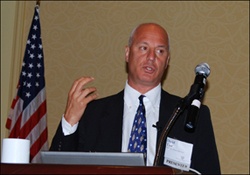JINSA’s 2008 Counter-Terror Conferences in Michigan and Texas
JINSA’s Law Enforcement Exchange Program (LEEP) Counter-Terrorism Conferences brought six Israeli experts to speak before more than 700 senior law enforcement officials over the course of two consecutive conferences in July. The conferences, held in the Detroit suburb of Livonia and in Austin, were hosted by those states’ respective attorneys general, Mike Cox and Greg Abbott.
JINSA’s Law Enforcement Exchange Program (LEEP) Counter-Terrorism Conferences brought six Israeli experts to speak before more than 700 senior law enforcement officials over the course of two consecutive conferences in July. The conferences, held in the Detroit suburb of Livonia and in Austin, were hosted by those states’ respective attorneys general, Mike Cox and Greg Abbott.
“Counter-Terrorism in a Changing World Symposium: Preparing Law Enforcement Executives for the Future”, featured six counter-terrorism experts drawn from the most senior ranks of the Israel National Police and other Israeli counter-terrorist agencies. Due to the professional level of the presentations, only general descriptions of the sessions can be discussed in print.
JINSA’s Steve Pomerantz joined Attorneys General Cox and Abbott at the opening of each conference to welcome the attending members of the law enforcement communities of Michigan and Texas. A 27-year FBI veteran who retired as Assistant Director, Steve Pomerantz joined JINSA in 2005 as director of counter-terrorism and today is associate executive director. During one of his three tours at FBI headquarters, Pomerantz served as chief of the counter terrorism section.
The head of the Israel National Police Bomb Squad also made a presentation that covered the methodology and techniques used by terrorist organizations to create and deliver bombs, from those carried by suicide bombers to IEDs and car bombs. He also explained responses Israeli developed, oftentimes after the fact. The understanding that the Israeli people have paid in blood for their body of knowledge in counter-terrorism is what motivates their commitment to the Law Enforcement Exchange Program – to provide information that may help the United States avoid the losses that Israel has already suffered.
Maj. Gen. David Tsur, who recently retired as commander of the Tel Aviv Police District, discussed practical methodologies developed in Israel to achieve what is now a coordinated response to acts of terrorism. The lessons were learned the hard way, Tsur told the audience, in the wake of a devastating series of terror attacks in 2001 and 2002. Bureaucratic barriers and “turf wars” were eliminated when it became obvious that they had become impediments to preventing terror attacks.

Former Israel police attaché in Washington, DC, Maj. Gen. Simon Perry explained the central role of the intelligence analyst in the Israeli counter-terrorist system. He discussed techniques for collecting, analyzing and disseminating law enforcement intelligence information and Israeli lessons-learned from investigations of terrorist organizations.
When 16-year-old would-be suicide bomber Hussam Abdu was detected at the Hawara checkpoint on March 23, 2004 it was the head of the Israel National Police Crisis Negotiation Unit that methodically talked him through the process of removing the explosive vest. Addressing the conference, he discussed the Abdu case and many, many others. In fact, no one in the world has more understanding of suicide bombers than this police commander, a trained psychologist. He has debriefed every single thwarted suicide bomber in Israeli custody and has built up a body of knowledge on how these human bombs are recruited, trained and the operational details of their deployment.
Gideon Avrami secures some of the most lucrative targets in Israel. A colonel in the IDF reserves, he spent years in charge of security for Israeli embassies, for El Al Airlines and for the Azrieli Towers, twin 50-story mixed-use buildings in Tel Aviv. Today, Avrami is the director of security for the Jerusalem Mall, the largest enclosed shopping center in Israel. Discussing the leveraging of private sector security services to augment local police forces, Avrami explained security systems and procedures employed in Israel by the operators of privately owned, public spaces such as sports venues, entertainment complexes and shopping centers. He gave practical information related to the close relationship between private sector security officers and the police in Israel and how that success can be applied in the United States.
When he recently retired from the Israeli foreign intelligence agency, the Mossad, Yoram Hessel had risen to the position of chief of global operations. A private consultant today, Hessel delivered a compelling brief designed for local law enforcement on how the intelligence process works and its significance in formulating responses to terrorism.
“One of the keys to effective law enforcement is a sharing of knowledge,” Matt Frendewey, spokesman for Michigan Attorney General Mike Cox told the Detroit Free Press. “It’s about law enforcement coming together.”
The Detroit News noted that Howell, Michigan Police Chief George Basar who is also this year’s president of the Michigan Association of Chiefs of Police, reminded the officials on hand that looking out for their communities is at the heart of homeland security. “As we all know, we’re the first line of defense,” Baser said. “We know the various targets in our communities that need to be secured. We spend a lot of time building relationships with our community groups. The best successes at homeland security start at the local level.”